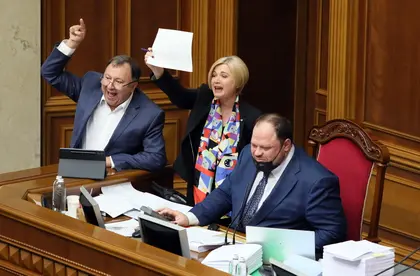The Ukrainian parliament on Sept. 23 supported the second reading of President Volodymyr Zelensky’s “deoligarchization bill” in an attempt to curtail the influence of the country’s wealthy elite.
The bill was supported by 279 lawmakers. The votes mainly came from Zelensky’s 244-member Servant of the People party which provided 229 votes, three over the required minimum.
The bill legally defines the word “oligarch” and imposes restrictions on anyone who meets this definition. The National Security and Defense Council, headed by Zelensky, will have its powers expanded and will draw an official oligarch registry.
Those on the list will be banned from donating directly or indirectly to political parties and participating in the privatization of state assets.
To be recognized as an oligarch, a person must meet at least three out of four criteria: direct involvement in political activities, considerable influence over media, be a beneficiary of monopolies recognized by antitrust authorities and ownership of assets exceeding Hr 2.2 billion ($81 million), excluding media assets.
A person must either hold a top-level public office or be affiliated with someone in that position. All top government officials will be required to declare any non-public contacts or meetings with oligarchs.
Moreover, a person who has financed political parties, ads or protests can also be defined as an oligarch, according to the legislation.
The influence on the media could be both direct or indirect meaning that even a person without official ownership of media outlets could still be defined as an oligarch.
Critics of the law say that the criteria are too arbitrary and will allow the Security Council, which is controlled by the president, to decide who is an oligarch.
The vote was mired in controversy, when First Deputy Speaker Ruslan Stefanchuk, who led the hearing, passed a provision to vote for amendments in bunches, cutting opposition lawmakers from the chance to stall the voting.
“Dictatorship,” yelled lawmaker Mykola Kniazhytsky, representing the 27-member European Solidarity faction led by ex-President Petro Poroshenko, who can soon end up on the “oligarchs’ registrar.”
On May 11, Security Council Secretary Oleksiy Danilov said that there are 13 people who fall under the definition of oligarch in Ukraine. He didn’t mention them by name.
As of now, Zelensky’s political opponent, Poroshenko, falls under the voted criteria. The European Solidarity faction voted against the law.
Wealthy businessmen Rinat Akhmetov, Ihor Kolomoisky, Ihor Palytsa, Serhiy Lyovochkin, Dmytro Firtash and Victor Pinchuk are the primary losers of the passed legislation. They hold vast assets in key sectors of the economy and have major influence through media holdings and politicians seen as loyal to their interests.
The bill was heavily criticized by Ombudsman Lyudmila Denisova and Speaker Dmytro Razumkov, whom Servant of the People faction head David Arakhamia accused of stalling the legilsation. Razumkov “is deliberately attempting to bring down the deoligarchization law,” said Arakhamia.
After the parliament voted, the bill will take force after Zelensky’s imminent signature.
You can also highlight the text and press Ctrl + Enter




